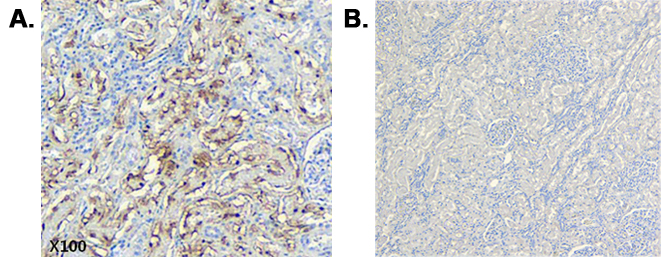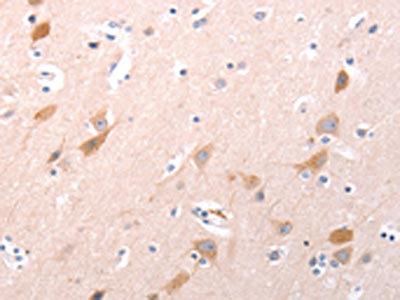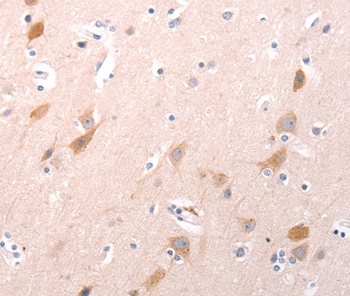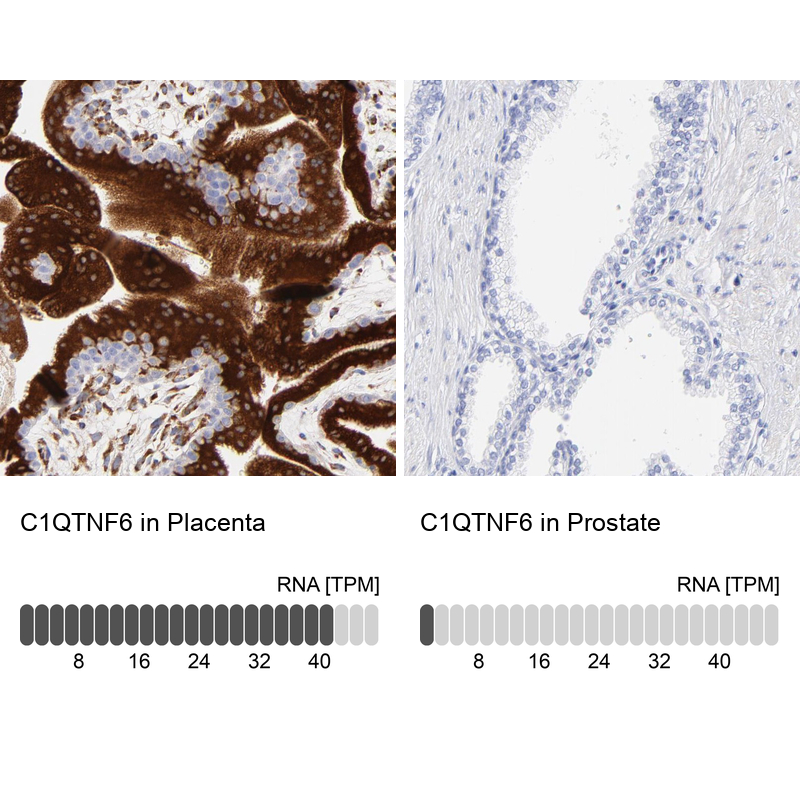
Immunohistochemical staining of CTRP6 using anti-CTRP6 (human), mAb (256-E) (Prod. No. AG-20A-0093) in human tissue. Method: A. Paraffin-embedded human kidney tissue, showing stained cell cytoplasm using anti-CTRP6 (human), mAb (256-E) at dil
anti-CTRP6 (human), mAb (256-E)
AG-20A-0093
ApplicationsWestern Blot, ELISA
Product group Antibodies
ReactivityHuman
TargetC1QTNF6
Overview
- SupplierAdipoGen Life Sciences
- Product Nameanti-CTRP6 (human), mAb (256-E)
- Delivery Days Customer10
- ApplicationsWestern Blot, ELISA
- CertificationResearch Use Only
- ClonalityMonoclonal
- Clone ID256-E
- Concentration1 mg/ml
- Gene ID114904
- Target nameC1QTNF6
- Target descriptionC1q and TNF related 6
- Target synonymsCTFP6, CTRP6, ZACRP6, complement C1q tumor necrosis factor-related protein 6, C1q and tumor necrosis factor related protein 6, complement-c1q tumor necrosis factor-related protein 6
- HostMouse
- IsotypeIgG1
- Protein IDQ9BXI9
- Protein NameComplement C1q tumor necrosis factor-related protein 6
- Scientific DescriptionCTRP6 mediates the phosphorylation of AMPK and acetyl-CoA carboxylase (ACC) in skeletal muscle cells, subsequently mediating glycogen accumulation and fatty acid oxidation. It induces the expression of the potent anti-inflammatory cytokine IL-10 in macrophages. CTRP6 may be a potential serum marker for hepatocellular carcinoma, contributing to tumor angiogenesis by activating the Akt pathway. CTRP6 was also shown to be associated with obesity, type 1 diabetes mellitus (T1D), vitiligo (depigmentation of the skin) and ASFV (African Swine Fever Virus). CTRP6 forms homotrimers and higher-order oligomers and it may also form heteromeric complexes with CTRP1. May be involved in kidney inflammation. - Monoclonal Antibody. Recognizes the N-terminal half of human CTRP6 full-length protein. Detects bands of ~16kDa and ~32kDa by Western blot. Isotype: Mouse IgG1kappa. Clone: 256-E. Applications: ELISA, WB. Liquid. 0.2microm-filtered solution in PBS, pH 7.4. Contains no preservatives. CTRP6 mediates the phosphorylation of AMPK and acetyl-CoA carboxylase (ACC) in skeletal muscle cells, subsequently mediating glycogen accumulation and fatty acid oxidation. It induces the expression of the potent anti-inflammatory cytokine IL-10 in macrophages. CTRP6 may be a potential serum marker for hepatocellular carcinoma, contributing to tumor angiogenesis by activating the Akt pathway. CTRP6 was also shown to be associated with obesity, type 1 diabetes mellitus (T1D), vitiligo (depigmentation of the skin) and ASFV (African Swine Fever Virus). CTRP6 forms homotrimers and higher-order oligomers and it may also form heteromeric complexes with CTRP1. May be involved in kidney inflammation.
- ReactivityHuman
- Storage Instruction-20°C,2°C to 8°C
- UNSPSC41116161






